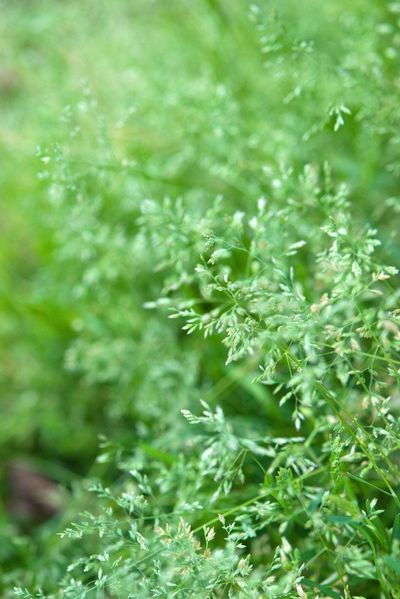Winter Grass Management
The grass is distinctive in appearance, with a coarser texture and lighter green color than turfgrass. The seedheads are also noticeable, and not very pretty. Winter grass management generally requires careful planning and a number of approaches, including both cultural and chemical methods. Be vigilant because not all seeds germinate at the same time. Control usually requires careful attention for at least two or three years. Winter grass seeds germinate when temperatures are cool in fall, often out competing other, more well-behaved grasses. The marauder overwinters in turf and comes to life in early spring. One plant produces hundreds of seeds that can remain dormant in the soil for many years. It usually dies out in the heat of summer, but by that time, turfgrass is weakened and is easily infected with yet more winter grass when weather again turns cool.
Controlling Winter Grass: Cultural Management
A healthy lawn is better able to withstand encroachment by winter grass. Water deeply but infrequently to help turfgrass develop long, healthy roots, but don’t water more than absolutely necessary. Turfgrass can withstand a little drought, but winter grass will be challenged by dry conditions. Remove small patches of winter grass by pulling. Fortunately, the roots are shallow and controlling a few weeds isn’t difficult. Avoid high nitrogen fertilizer when winter grass is germinating in early spring; nitrogen will help winter grass survive into the next winter and spring. Mow your lawn frequently with the mower set a little higher than usual, as scalping the lawn weakens turfgrass and encourages weed development. Bag the clippings to prevent spread.
Managing Winter Grass with Pre-Emergents
Pre-emergent herbicides are probably the most important tool for controlling winter grass. Be sure to purchase an appropriate product labeled for control of winter grass or annual bluegrass. Apply pre-emergent herbicides before seeds germinate – usually in fall or late winter.
How to Kill Winter Grass with Post Emergents
Unlike pre-emergent products that provide some level of residual control, post-emergent herbicides are most effective in late spring when all seeds have germinated for the year. If you haven’t applied post-emergents before, it’s a good idea to apply again in autumn, even when it appears that the weeds are under control.
